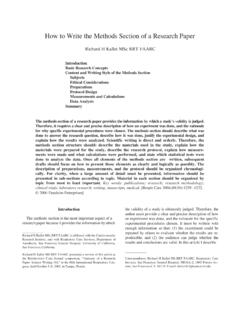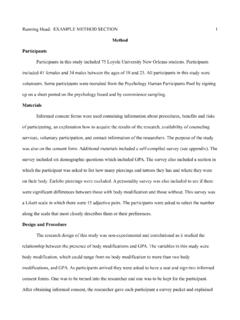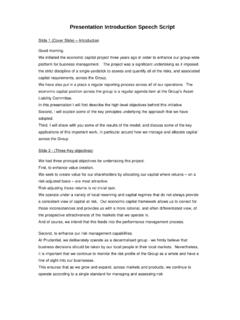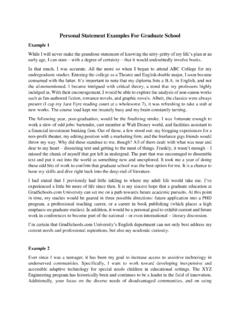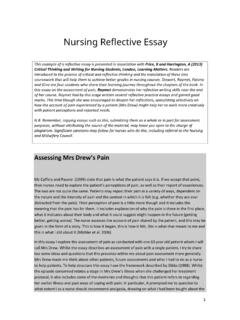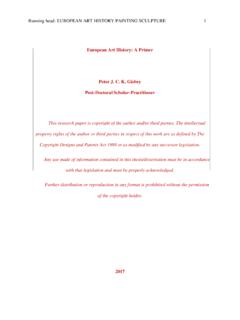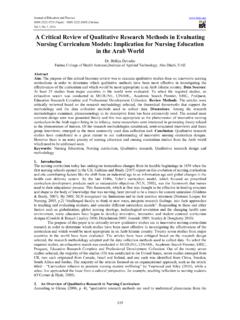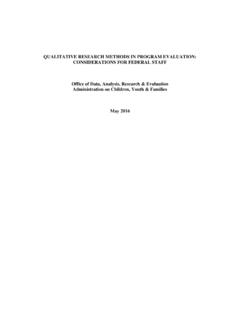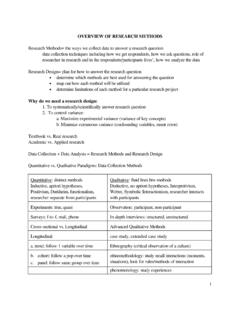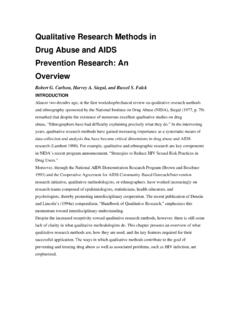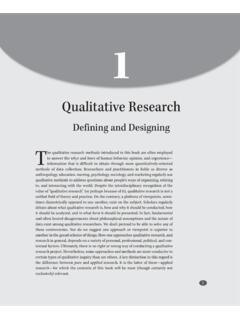Transcription of An overview of qualitative research methodology for public ...
1 Revi ew A rt i c l e An overview of qualitative research methodology for public health researchers A bs tra ct qualitative research methodology enables researchers to explore social and behavioural issues related to public health that are not achievable with quantitative methods . Several complex public health issues can be better understood by exploration using qualitative methodologies. However, these methodologies are underutilized in public health research particularly in developing countries. This paper aims to introduce qualitative research to students and researchers in public health in developing countries and to encourage its use in research by presenting an overview of how to undertake a qualitative research study. Key aspects of this methodology include choosing and working within a theoretical framework, recruitment of participants, following the right process of data analysis, and presentation of findings for publication.
2 Key words: qualitative research methodology , public health, developing countries INTRODUCTION. qualitative research is useful when the research focuses on complex issues such as human behavior and felt needs. The goal of qualitative research is therefore to help us understand social phenomena with the help of views and experiences of all the participants.[1] While studies that ask the question how many'' or how much'' require a quantitative approach, qualitative studies usually ask the questions, what'', how'' or why'' of a phenomenon.[2] Creswell defines qualitative research rather succinctly. He states, qualitative research is an inquiry process of understanding based on distinct methodological traditions of inquiry that explore a social or human problem.
3 The researcher builds a complex, holistic picture, analyses words, reports detailed views of informants, and conducts the study in a natural setting.[3]. Anton N. Isaacs School of Rural Health (MUDRIH), qualitative research is increasingly being accepted as a necessity in public health[4] and is usually Monash University, Australia utilized in three circumstances: 1. To study the social, cultural, economic, and political factors that Address for the Correspondence: influence health and disease. 2. To examine interactions between various stakeholders in an issue Dr. Anton N. Isaacs, of public health importance and 3. To explore how people and their communities interpret health PO Box 973, Moe, VIC, and disease.[5] For instance, a qualitative study on the beliefs of dengue prevention in a Mexican city Australia, 3825.
4 E-mail: showed that while health officials were concerned about reducing mosquito breeding sites, people living in areas of high mosquito density believed that they only needed to look after themselves when they got sick so that mild fevers could be prevented from getting worse.[6] The authors of this study Access this article online concluded that dengue prevention messages needed to be made clearer to the public in order to render Website: preventive strategies more effective. Hence qualitative research methodologies enable researchers to unpack the socio-cultural determinants of health. Within the epidemiological triad of agent, host and DOI: environment, this methodology is useful to explain disease causation by exploring how the human Quick response code: host interacts with the agent and the environment.
5 It also helps identify the reasons for the different ways of interaction. Disease prevention strategies generated out of good qualitative research tend to be more effective since they focus on the very core of unhealthy host behavior. Although qualitative research has been contributing significantly to public health internationally, it is yet to receive its due in the field of public health in developing countries.[7] This paper aims to introduce qualitative research to students and researchers in public health in developing countries International Journal of Medicine and public Health | Oct-Dec 2014 | Vol 4 | Issue 4 318. Isaacs: qualitative research in public health and to encourage its use in research . Of course, it is impossible to right.
6 Therefore the theory one chooses determines the issues that condense all of qualitative research methods into one journal article. one will give priority to study, the direction that one will consider Hence this paper only aims to provide a basic framework which to be most profitable to find answers and the kind of data that one novice researchers could use to undertake research that requires a decides to collect.[13] It is not possible to study everything while qualitative methodology . undertaking qualitative research . Hence, theory shapes the sort of things that the researcher is interested in and informs the methods Key elements of qualitative health research and techniques needed to carry out the research .[14]. As with any research endeavour, the process commences with writing Despite the importance of following a theoretical framework in the research proposal which is a plan or formula that researchers qualitative research , it is not uncommon for qualitative reports will follow in undertaking the study.
7 qualitative research proposals in public health to not specify the theoretical framework that the are different from quantitative proposals in several ways. They study is built on. Rather they only list the number of focus groups include the writing of the literature review, the need for a theoretical or in-depth interviews that were conducted.[15] It is suggested that framework, and how data will be collected and analyzed. health researchers who do not specifically state the theoretical The background and literature review framework that their work is underpinned by, could unwittingly be qualitative research articles traditionally have a detailed literature using qualitative Description (QD) as their framework.[16,17] QD. review. The review establishes the importance of the topic and is a relatively recent method of naturalistic inquiry which aims to provides background information needed to understand the present a rich, straight description of an experience or an event.
8 ''[18]. study. It also shows readers that the researchers are familiar with In QD studies, participants are asked to describe events in their own significant and up-to-date research relevant to the topic.[8] The review words and to suggest ways of improving outcomes or changing includes not only previous work done in the area but also types of behaviours.[19]. methodologies that have been used to undertake these studies. The Unlike in other qualitative designs such as phenomenology, review finally needs to state the motivation for the study and the ethnography and grounded theory, where the researcher interprets context from which the researcher is approaching it. This is referred the said word within a context, in QD, the researcher stays close to to as reflexivity and is an important component of rigor.
9 [9]. the data. The QD design is typically valuable in answering questions The theoretical framework such as What reasons do people have for using or not using a service The next step in planning a qualitative methodology is to decide on or procedure? Who uses a service and when do they use it? .[16] The a theoretical or conceptual framework. This can be very confusing design therefore presents rich information that may be grounded for novice researchers because there are several theoretical in cultural and environmental contexts. This makes research using approaches that can be used such as Phenomenology, Discourse this approach understandable not only to those experiencing Analysis, Grounded Theory and Ethnography.[10,11] What adds to the health disparities but also to clinicians and administrators who are confusion is that the various books and articles that describe theory responsible for reducing those disparities.
10 Although QD lacks a in qualitative research are all different from each other.[12] Since strong theoretical basis and is underpinned by the work of others qualitative research has its origins in the Social Sciences, students in the field, its findings can pave the way for future theory-based of these disciplines will be more familiar with the different theories research .[18]. that have been developed. So what is theory? In simple terms, theory is the lens that a researcher uses to look at an issue. The Sampling strategy Once the theoretical framework is decided, the next step is to For example, consider the mental health problems faced by rural decide the sampling strategy. The type of sampling typically used women. Some researchers will be more interested in identifying the in qualitative research is systematic, non-probability sampling.
